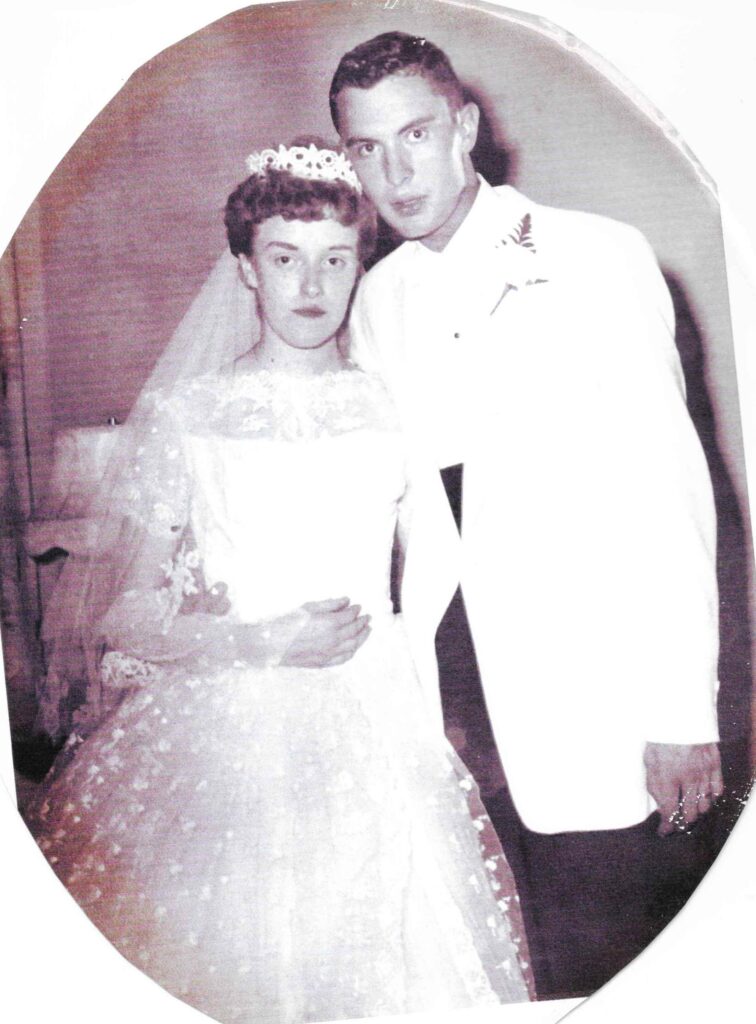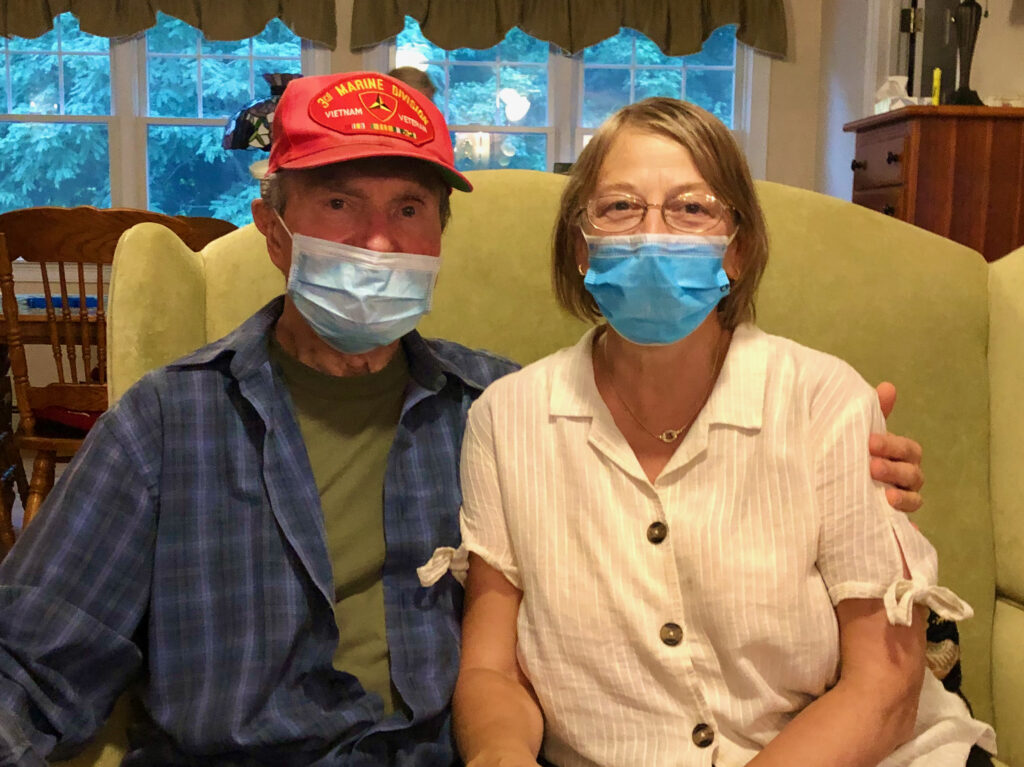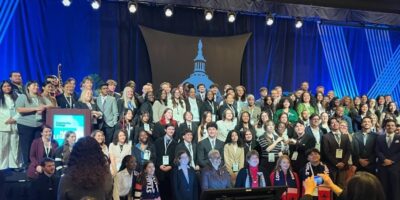“The advantage of a bad memory is that one enjoys several times the same good things for the first time.”
Friedrich nietzsche
My mother and father were childhood sweethearts in Warren, Ohio who married in 1958, just after graduating from high school. Dad had already enlisted in the Marines, and after the ceremony and the celebration, the newlyweds headed south to Camp Lejeune.

The motto of the United States Marine Corps is “Semper Fidelis” which means “always faithful,” and there is no better way to describe my father.

Faithful to his country, he spent more than twenty years in military service, including two tours of Vietnam.
Faithful to his wife and family, he lived steadfastly by Mom’s side for fifty-six years, until she passed away in 2014.
And many of those were not easy years. Mom had a stroke when she was 44 that left her partly paralyzed. Later, she suffered heart attacks, brain and breast cancer, and a number of other ailments that kept her mostly homebound.
Through it all, though, Mom smiled and waved away worry, and Dad did whatever needed to be done to care for her.
When Mom died, I encouraged Dad to move north so he could be near family; but he felt closest to Mom in the house they had shared just outside of Houston, Texas. And besides, he said, New England winters are too long and too cold.
So, there he stayed, alone with his remembrances. And time went by.
Then, one day he was in the produce aisle at the grocery store and couldn’t recognize the celery.
It was a moment that he had feared for a long time, since losing his own mother, slowly and one painful lost memory after another until there were none left, to Alzheimer’s Disease.
In the frightening weeks that followed, more words began to escape him, and everyday tasks like cooking meals or cleaning the house became more difficult as he struggled to remember how to use the stove and where he kept the paper towels.
When the streets in the neighborhood where he had lived for twenty years became confusing to him, and he could no longer easily find his way home, he knew the time had come to stop driving, buy a winter coat, and head north.
Dad had always been a capable, healthy, upbeat, and self-reliant man, who was proud that he had never spent a night in the hospital in his life, and rarely visited a doctor.
But that was the first order of business when he arrived in Massachusetts in 2018 and moved in with me and my family. A couple of office visits and a few tests later, and we learned that it was not Alzheimer’s, but the early stages of Parkinson’s Disease Dad was experiencing.
We also learned that his particular condition is associated with Marines who were stationed at Camp Lejeune, where for decades the water was contaminated with industrial chemicals; and with Marines who had “boots on the ground” in Vietnam, where they were exposed to Agent Orange, the chemical used to eliminate forest cover and crops for North Vietnamese troops.
While still a serious diagnosis that will require lots of care, Dad was relieved and even lighthearted when he heard the news. It meant that, although he was likely to begin to feel more physical effects of his condition, his memory lapses and moments of confusion may not tumble into the darkness of complete dementia.
With new medication, Dad’s physical and mental symptoms were more manageable, and he continued to stay with us for a while. But we were at work or school all day while he was alone, and earlier this year, we all recognized Dad needed more care—and company—than we could provide.
In February, on President’s Day, he moved into a small, comfortable assisted living facility just a few miles from our home.
Most of the two dozen or so residents there are older than Dad and not nearly as physically active. For years he ran marathons, and even now, with slight tremors and stiffening legs, he still manages to walk a few miles each day, or ride an indoor exercise bike when the weather is cold.
Still, he made a couple of friends: a former Navy sailor with a bawdy sense of humor who always wears an “Uncle Buck” ball cap, and a kind, constantly smiling retired schoolteacher a few years younger than Dad, who would take morning strolls along the nearby streets with him.
Then, suddenly the whole world changed.
In mid-March his home, like others across the country, went into lockdown, carefully restricting visitors, feeding residents alone in their rooms, and requiring staff to wear masks and other protective equipment.
Despite the precautions, a few weeks later, COVID-19 went rampaging through the facility. Several residents and staff tested positive and had to be hospitalized and we quickly brought Dad home again where he went into quarantine with the rest of us.
It was an anxious and challenging time for everyone. But after a couple of weeks, as things began to settle into a new kind of normal, my ordinarily cheerful father still seemed unusually distracted, flustered and, as he described himself, “melancholy.”
He would retreat to his room for hours at a time and simply sit quietly by the window watching the world go by.
And so it was that, one morning while I was busy Zoom conferencing in my basement office like half of America, my wife decided it was time for Dad to get outside and take a drive with her on a sunny spring day.
As she motored along, she tried to pull him out of his shell and cheer him up a bit by offering to stop by his favorite farm stand and pick up some fresh fruit.
“I’m sorry your transition to your new home got interrupted so soon,” she told Dad, “You weren’t there very long before we brought you right back home again.”
“I may not have been there long,” Dad sheepishly replied, “But I was there long enough to fall in love.”
[Pause for a few heartbeats…]
Suddenly, the anxiety and sadness Dad seemed to be experiencing while in quarantine, which we thought was a combination of worry about the virus, the quick change in routine between homes, and the confusion that came along with his Parkinson’s, made a different kind of sense: My father was a nearly 80-year-old lovesick man.
That constantly smiling retired schoolteacher, it turned out, had him smitten.
He hadn’t had the chance to say a proper goodbye before being rushed out the door.
He had no idea how she was doing or how to reach her, and did not know when, or if, he would be returning to his new home.
On top of it all, he had no idea how to break the news to his fifty-two-year-old son that, after decades of loyalty to his now-deceased mother, he had somehow fallen in love with a near-stranger he had met over a jigsaw puzzle in the day room of a nursing home.
Still a bit shocked by his bombshell news, my wife turned a one-eighty in a roundabout, headed directly back toward Dad’s new home, and called along the way to ask about his lady friend, and whether she could come outside so Dad could wave to her.
What began as a friendly wave from a car window quickly turned into a tearful, semi-masked embrace. They were each so happy to know the other was still healthy, and giddy as a couple of teenagers to be together again, even if only for a moment.
The attendant at the home explained that they had been observing this special friendship develop, but weren’t sure what we knew, and, since both of them were still mostly independent, fully-functioning adults, wanted to respect their privacy.
And, she admitted, they were pretty darn cute to watch.
Dad stayed with us for a couple more weeks until it was safe for him to return. During that time, he was a changed man, with pep in his step and a sparkle in his eye. He still withdrew to his room from time to time, but when he did, it was to spend a couple of hours on the phone, catching up with the day’s news and getting to know his new friend better.
Months ago, we had made plans to celebrate Dad’s 80th birthday with a big party and reunion of family members from all across the country. But when the day recently arrived, we contented ourselves with a handful of people under a tent in the backyard and happy birthday phone calls from distant family and friends.
The entire world could have shown up—or no one at all—and Dad wouldn’t have minded one way or the other. He just sat in the shade on a hot summer day, holding hands and smiling with a happy schoolteacher.
As terrified as Dad had been about sharing his mother’s fate and dying alone, robbed of his ability to remember events and people he cared about, now that his own memory is occasionally failing him, he is more relaxed and at ease than he has ever been, even finding silver linings as he “enjoys several times the same good things for the first time.”
And he has not forgotten Mom.
Pictures of the two of them hang proudly and poignantly around his room.
A pair of black and whites from high school graduation and their wedding, just a few weeks later, in 1958.
A Marine Corps Ball sometime in the early ‘70s, with Mom’s fiery red hair ablaze over a green gown—her favorite color—and Dad looking sharp in his dress blues and gleaming white hat.
And there in the center of it all, a hand-carved, wooden Marine Corps insignia, mounted on a field of maroon, surrounded by Dad’s stripes and bars, with the proud motto unfurling along a banner in the eagle’s beak: Semper Fidelis.
Always faithful.
To which today I would add: Omnia Vincit Amor.
Love conquers all.







